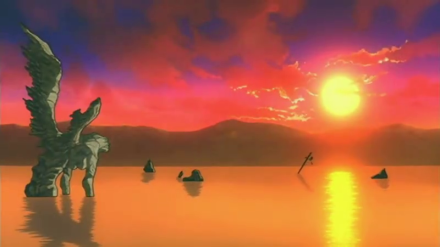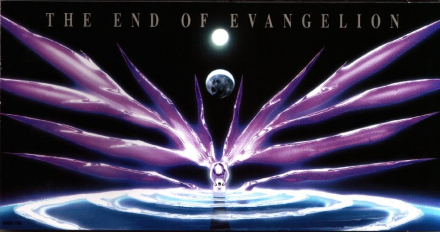Chances are that if you were linked here from another blogger pal, then you might be new. To those first-timers, “Hi, I’m Takuto, welcome to my anime cafe!” As part of the OWLS blog tour’s third monthly topic, “Sanctuary,” I decided to pull in all of the Evangelion sources that I could, original series and Rebuild alike, in order highlight that no matter where you may be in the apocalyptic future of Tokyo-3, captain Misato Katsuragi’s apartment will always remain a safe haven from the wrath of the heavens.
A sanctuary is a place of safety and stability. In anime, there are several different places and environments that characters call “home.” For this topic, we will be discussing locations and settings in anime.
Eva is a franchise that you might already know means the WORLD to me, so allowing myself to revisit its iconic universe is a real treat. Thanks Lyn for the prompt!

A brief discussion on Misato’s Apartment as it appears in the 26-episode 1995 series “Neon Genesis Evangelion,” the critical 1997 film “The End of Evangelion,” and the “Rebuild of Evangelion” film series, produced by Gainax and eventually Khara, all of which were written and directed by Hideaki Anno.
First, A Welcoming Party
Eva opens up on an alternate present-day Tokyo where “Angels,” ironically named beasts of pure destruction, are in recent rise for some bizarre reason. Shinji Ikari, son of NERV commander Gendo Ikari, is called in to pilot the towering [neon] colored humanoid robot Evangelion Unit-01. NERV, an organization bent on the survival of the human race no matter the cost, may very well be the last battlefront in stopping these beings of terror, but it is ultimately up to Eva pilots like Shinji to determine whether humanity lives to see another day.
Shinji survives the first angel encounter against Sachiel. Barely. But the fact remains that he did actually save everyone, which is why his cold father ensures that Shinji remains on campus in case of another attack. No, the two don’t share the same living space, let alone sleep in the same house. Instead, they mutually agree that rooming together would be the worst possible outcome. Like a mother overprotective of her ducklings (this is funny because she has a pet penguin), the clumsy yet strong captain Misato Katsuragi takes Shinji under her wings and shelters the boy at her own apartment.

Misato’s place is graphically located quite a ways away from NERV HQ, which is probably for the best considering that they are always on call, and that they already over-shoulder work everywhere else they go. It’s also crucial to note that we never see any interactions with the other apartment members in the complex, nor are the other lights on. It’s only Misato’s that is lit, like a lonely lighthouse guiding lost ships. After the two go out to pick up some welcome party snacks and view the majestic city sunset, the two share a memorably warm if not simple exchange before entering the household:
Misato: “Your things ought to have been delivered already, Shinji. I just moved here myself, ya know? *glancing back* Hey, come in.”
Shinji: “Uh, I don’t . . . want to intrude.”
Misato: “Shinji, this is your home now.”
Shinji: *hesitant pause, finally steps into the apartment, crossing the sliding door lining along the floor, and stares upward shyly* “I’m–I’m home.”
Misato: *closed eyes, smiling* “Welcome home.”
[the apartment door automatically slides shut, revealing the tag M.KATSURAGI]
Misato: “Ummm, as you can see, the place is just a little bit messy but uh, heh, go ahead and make yourself comfortable.”
This is your home now. Wow. Just by reading this you can already get a feel for both of our characters. Shinji is shy, not wishing to impose upon anyone his own troubles. Misato comes across as casual, relaxed, and friendly. But just as how she makes her cameo in a flashy blue sports car with nothing but a seductive picture to go by, the atmosphere quickly shifts from one of formality to an air of light-heartedness. Evangelion masterfully plays with moods depending on how the characters should be reacting to certain situations, and Misato’s apartment, in fact, could almost represent the peaceful and joyful side of the chaos. Now that we’re all acquainted, it’s time to get to know each other beyond the name tags.

Make Yourself Comfortable
“Is this how you act in public? In front of your friends!?” You might have gotten this spiel by your parents if you’ve ever for a second acted, heaven forbid, without concern for public opinion or manners. Going back to the question, of COURSE I don’t act like this out there—this is home, and home is the one place where an individual should feel less pressured to “suck in their gut,” so to speak. Home is where I can let my guard down, and the characters in Eva do exactly that at the apartment. These moments make up the lighter side of a series otherwise known to offer psychological trauma and emotional turmoil.
Shinji, Misato, and eventually Asuka are free to lounge around with a temporary leave of stress that comes with saving the world. At first it was only a woman and her pet. Soon the dynamic opens up to invite a pseudo son (episode 2), followed by a pseudo daughter (Asuka in episode 9) and an anything-but father (Kaji). Even aunty Ritsuko comes along and plays house at one point!

Like mentioned earlier, Evangelion is rife with iconography. Some early examples include:
- Episode 2’s introduction of the song, Misato’s theme
- Episode 2’s fridge reveal of nothing but ice, snacks, and lots of beer
- Episode 2’s infamous toothpick scene (adding on with the straw scene in the Rebuild)
- Episode 2’s recitaiton of “Unfamilar Ceiling” (sheesh, one would think that episode 2 is important for some reason)
- Episode 9’s synchronization training through DDR and fashion
- Episode 16’s “I’m bored, so kiss me” by Asuka
Little Shin’s Room ❤
Homes allow people to ponder and create. In the show, we see the characters questioning their own existence, their place in the world, and whether the actions they take are justifiable. The apartment also allows philosophies to be revealed, such as Misato’s “Not everything must be answered with a yes m’am,” or “Wash away your troubles—bathing cleans the mind and soul!” Speaking of bathing . . .
Differing personalities invite conflict, for not everything in Misato’s apartment is happy-go-lucky. Time spent alone allows the darkness to sneak back into their heads. We are permitted to see the characters at their worst, such as this disturbing 20-second bath tangent by Asuka, portrayed by the incredible Tiffany Grant. Whereas bath scenes are supposed to be tranquil and stacked with fan service, Eva, being Eva, turns this cliche on its head to emphasize that not all acts at home are frivolous. Sometimes we get into fights, and that’s natural. Easily, the worst-case scenario remains the pinnacle choking scene from The End of Evangelion, which brings an entirely different and off-putting light to the children’s home, both figuratively and literally.

What’s So Special About An Apartment
Not much, actually, only that it’s not just a house—it’s a home. A sanctuary from work stress and the trivialities of daily life, if you will. Even though these types of apartments are numerous in Japan, Eva still goes the extra mile in presenting the physical space uniquely. For one, the cinematography is sharp. This is reflected by the angles used, enhancing censored scenes like Shinji’s toothpicks or items such as the bras and lingerie that hang from the ceiling. In this way, the show stays interesting and provides enjoyment for a second time through. Utilizing warm hues of yellow for lighting also provides a sense of ease, unlike the cold LED lights of a hospital or a laboratory (it is HUGE contrast to Rei’s apartment).
As much as it’s fun to break down the inter-workings of the minds of our favorite characters, or pick apart the cause and effect plots of our most beloved stories, taking a minute to admire the physical—locational settings—feels like a nice breath of fresh air.

It feels like we’ve nearly covered it all, but in fact there’s so much more to the development of the apartment itself. How its atmosphere changes over the course of the story almost makes it seem as if it were a living, breathing entity. Home is a place to relax and be comforted by all the things, living or not, you cherish. It should be a place of intimacy, of quietude, a place to be yourself without anyone telling you how to live. I know not everyone has it this way, and I’m sorry, but I hope you have found your own little sanctuary somewhere in this wild world, or that someone like Misato has provided this comfort space for you.
To those who do settle down at the house, aren’t you the most “yourself” in the comfort of your own home or room? I know I am, and I hope that doesn’t change for at least a little while now. We all need our me-time, and there will never, ever, be something wrong with a lil’ peace and quiet. For those in solitude, just remember that even if you’re all alone without anyone to come home to, your own home will be waiting for you, eyes closed and smile wide, just as Misato was to Shinji.
Welcome home.

Take care of yourself. – Neon Genesis Evangelion episode 26 title
Evangelion in its entirety clearly means a LOT to me. You could almost say that it influenced the shape of my character. If you’re interested in more of my ramblings and personal thoughts, please, feel free to browse the archives for more of that Eva goodness!
This concludes my March 8th entry in the OWLS “Sanctuary” blog tour. Please check out Matt’s (Matt-in-the-Hat) post discussing how, in Sword Art Online, there exists sanctuary within gaming. He apparently used my Fairy Dance musings as some inspiration, which makes me all the more excited to check it out! I’ll now toss the ball to BeckNaja (Nice Job Breaking It, Hero), for she will be jumping into Haikyuu!! this Friday, March 10th. (But let’s be honest, when is she not engaged with the show? lol) Thank you so much for reading, and until next time, take care ~
– Takuto

Sleep tight, Misato . . . such a mess, at least she looks comfortable enough







